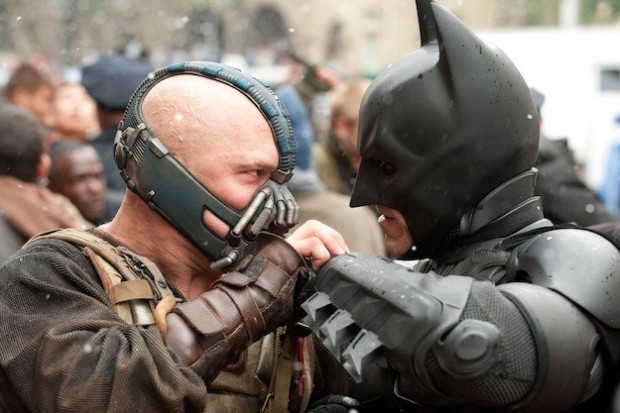The Amazing Spider-Man review
by Luke Jones.
There’s a scene towards the end of The Amazing Spider-Man where Peter Parker’s teacher tells her class that there are only ten basic plots in all of fiction. It would seem that the Spider-Man universe has even fewer as, after only ten years and three movies, Sony has decided to hit the reboot button and return to the beginning for the latest cinematic outing of ol’ web-head.
The Amazing Spider-Man has had a curious development given that director Sam Raimi was due to continue with the series and film Spider-Man 4, with original Spidey actor Tobey Maguire in place. Yet thanks to good old ‘creative differences’ the project was scrapped, and The Amazing Spider-Man quickly put together with (500) Days of Summer director Marc Webb calling the shots. The resulting movie promises the untold story behind Spider-Man’s origins, complete with a new darker, grittier tone.
Yet The Amazing Spider-Man never lives up to its title, and the untold story amounts to hints at a deeper conspiracy involving Peter Parker’s parents that never develop beyond the occasional moody glance or cryptic comment. This wouldn’t be a problem if the central plot was compelling, but as it plays out so similarly to the high school part of Raimi’s first Spider-Man it never engages as fully as it ought to.
Which is a shame as there is much to like about the new cast. Andrew Garfield feels like he has been described as Britain’s best new talent for about ten years now, and doesn’t disappoint with the big break he has so long deserved. More confident and lithe than Maguire’s Spidey, he convinces more as both the teenage Peter Parker and his snarky, sarcastic alter ego. It’s a shame that his best lines are in the trailers, ruining what should have been some of the bigger laughs of the film.
As his love interest, Gwen Stacey, Emma Stone is just as delightful, the equal of Peter Parker rather than unobtainable ideal. Garfield and Stone’s scenes together, that had so many fans worrying this would turn into The Only Way is Spidey, are the highlights of the film. Rhys Ifans also brings a lot to a thinly written villainous role, injecting (sometimes literally) much needed pathos as one armed scientist Dr Curt Connors.
Much of the blame instead must be placed at the feet of director Webb, whose approach tonally is at best misconceived. Batman Begins and Casino Royale have shown that grounded reboots can work brilliantly, but those are franchises that focus on serious, borderline pretentious characters. Spider-Man, with his radioactive spider-bite and clearly defined moral compass, simply does not warrant the same approach. As such the moments that felt so iconic in Raimi’s film feel contrived and neutered in Webb’s.
Take the death of Uncle Ben. Raimi’s film goes from Parker being presented with a clear chance to stop the murderer, to finding his Uncle dying on the sidewalk, to taking his first big swings as Spidey before confronting the killer. In Webb’s the lines are blurred, Parker’s opportunity to stop the crook less clear, and his subsequent search for the killer dragged on before being abandoned, unresolved.
As if this weren’t enough, the film also seems to lack confidence with its new grittier style. So while the mechanical web-shooters make a return, the villain this time around is an eight-foot lizard who hangs around in the sewer. While Parker shows his injuries after a heavy night as Spider-Man, he also takes his mask off at seemingly every opportunity in an age where every individual has a camera in their phone and every building has CCTV on its corner. He also makes the decision to overturn a very serious promise, made to a dying character, seemingly overnight for no other reason than because he really wants to. What’s even worse with that moment is that it is played as a romantic beat rather than the slightly grey and selfish decision that it clearly is.
It also means the film is less fun than Raimi’s. In a summer where The Avengers has already shown that lightweight isn’t always a bad thing this step away from pure enjoyment feels unnecessary, particularly with The Dark Knight Rises sure to fill the need for deeper superhero entertainment in less than a fortnight. At least the mixture of practical and CGI effects produce the most believable looking Spider-Man yet, even if much of the action is uninspired. Finally, despite the 3-D, there wasn’t one moment in the film as dizzyingly exhilarating as the train sequence from Spider-Man 2, or even the final hero shot from the original Spider-Man.
The Amazing Spider-Man is ultimately a failure because of a basic misunderstanding of the character, and an insistence on re-telling a story that didn’t need to be re-told. If Sony were keen to pursue the high school angle then they could easily have just created a sort of mid-quel to the first Raimi movie and given us the whole untold story rather than setting up a new money-spinning trilogy (just look at the Bourne series, where both Ultimatum and the upcoming Legacy take place in between events that happen during Supremacy, the second in the series). Sadly instead an awful lot of time and money has been spent on The Forgettable Spider-Man.



Comments
Post a Comment